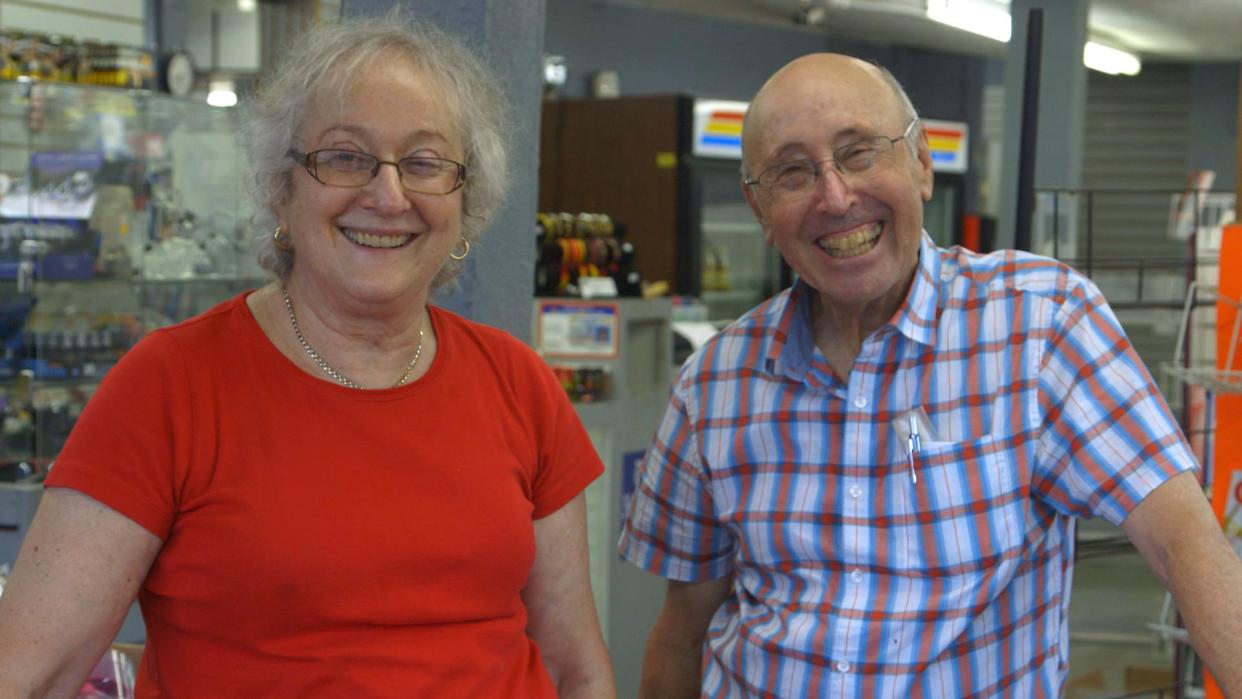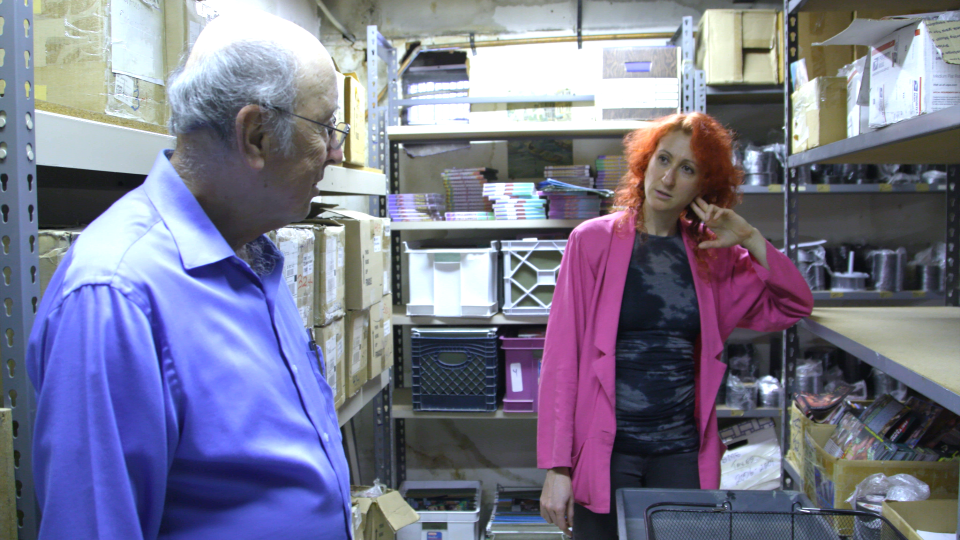The stranger-than-fiction tale of Circus of Books: How a straight, married, suburban couple became accidental gay porn pioneers

When Circus of Books, a legendary bookstore and porn shop in Los Angeles, opened in 1982, it became a haven for the city’s LGBTQ community. Both its original West Hollywood location and sister store in Silver Lake were more than just places for gay men to purchase X-rated VHS tapes, sex toys, and nudie magazines — Circus of Books was a safe, shame-free space for queer people to congregate and be themselves, during a dark time when the Reagan administration was not only ignoring the growing AIDS crisis in America but also cracking down on the pornography industry.
But few people would have guessed that the Circus of Books franchise was owned and operated by a heterosexual, Jewish, suburban, seemingly conservative married couple, Karen and Barry Mason. Even their three children, two of whom grew up to identify as queer themselves, didn’t know about the Masons’ secret business until they were teenagers. Now one of those children, musician/artist/filmmaker Rachel Mason, has directed the documentary Circus of Books, executive-produced by Ryan Murphy, about her parents’ double-life and reluctant role as LBGTQ-ally heroes.
Karen, a journalist, and Barry, and a scientist and engineer, fell into this unlikely line of work when Karen interviewed Larry Flynt and through that connection secured Barry a temporary side job selling and distributing Flynt titles like Hustler for some quick income. Seeing a gap in the market for Flynt’s more underground hardcore publications, they decided to take over a fledgling local bookstore — and within a decade, Circus of Books had surprisingly become one of the biggest distributors of gay porn in the United States. (It was actually the first retail location to sell Madonna's controversial Sex book in 1992.) Barry had a go-with-the-flow attitude towards the store, even after Circus of Books was entangled in an FBI pornography sting and he was prosecuted and almost sent to prison. But Karen, a devoutly religious woman, struggled for years — and actually still struggles — to reconcile her profession with her beliefs, even when the couple briefly dabbled in the business of producing porn themselves. Rachel can be seen breaking the fourth wall throughout the Circus of Books film, arguing with Karen as she tries to get her strict, combative mother to cooperate with the interviewing and shooting process. “To this day, she feels like she's been ‘outed,’” Rachel tells Yahoo Entertainment in an interview for Pride Month.
“My mom and dad have completely different, opposite almost, views on it,” Rachel explains. “I think to some extent, my mom for many years had a sense of ‘I wish there was something else you could tell people that we do, because this is a humiliating thing, and kind of underground. And we went to college, and we should've had something better to tell people that we do.’ But my dad is a totally opposite personality. He actually has always thought of it, I think, in an amused, satisfied light. I don't think he's ever had a single day when he's regretted it, or had any embarrassment or shame about it. If anything, he's enjoyed it. He's a really simple guy, and doesn't have any of those heavy religious, overwrought feelings that my mom does.”
Rachel, who is now 41, says when she found out in high school about her parents’ secret profession, she was thrilled. “It was at the height of the '90s punk/riot grrrl/queer explosion that I fell totally in love with, so everything about the store actually aligned with what I wanted to grow up and join into,” she says. “I remember thinking, ‘Wow, it's just kind of weird, because my parents are so not cool.’ They were not cool at all. I had friends that had really cool parents that smoked weed and were just interesting people, and my mom and dad were just squares, really boring.”
It might be assumed that Rachel’s younger brother Josh, who is gay, would have the same pleased reaction. But as his mother’s “golden child” who was closeted at time, the discovery messed with his head. “My whole thing was I wanted to embrace the counterculture, because I felt like I was part of it. I was madly in love with it and ran towards it, and embraced it to the point where I rejected everything else. I rejected my mom's religiousness, and I rejected the things I was supposed to do to fit in, whereas Josh had just the opposite feeling. He knew he was gay and instead of embracing his gayness and in any way seeking out gay people, he did the opposite,” Rachel explains. “He fought it. He tried very hard to date girls, or make it look like he was dating girls, and tried to blend in and look like he was a super-athlete, and a super-student, and all the things that could deflect attention from [his sexuality].
“He had his struggle with his actual gayness to deal with, and that store in some ways might've made it harder for him, because my mom had so many misgivings about it and this painful, very difficult experience with it,” Rachel continues. “[In the film] he tells me, ‘Your world was too gay. I didn't want to be like that.’ I think back, and yes, my world was super-gay. I had drag queens coming over all the time. To be part of the queer community at that time, you really did have to be more of an outlaw. And that isn't what Josh is, to this day. He's not a part of that queer counterculture. He's just a regular guy.”

One of the most emotional fourth-wall-shattering moments of Circus of Books is when Rachel cries while interviewing Josh about his struggle to come out and how, despite his parents’ vocation, he “genuinely thought he could get thrown out of the house [for being gay]. … When I look back on being queer myself, which I don't get into in the film because I wanted to keep the focus on Josh, it heightened that contradiction — like, how could he possibly feel that way?”
While Barry was his usual mellow self, Karen in fact was dismayed to find out her son was gay, and at first she actually thought Josh’s homosexuality was a punishment from God for running a gay bookstore. “I was shocked that my mom was so bigoted in her views,” says Rachel. “I thought it was just total bulls***, and I was really pissed-off about it. But that wasn't an actual revelation that came out of the process of filmmaking. I made the film because I know what a 180 she's made. And I actually feel like people that are able to make that kind of 180 are the ones who can convince others to make that same 180.”
Circus of Books ends happily with the Mason family marching past the store in West Hollywood’s Gay Pride parade with the L.A. chapter of PFLAG (Parents, Families and Friends of Lesbians and Gays) — with a proud, newly enlightened Karen right in the front, cheering and smiling. “So for me, the film itself has this possibility to do advocacy work now, because my mom is in it being so forthright about how she came around. And I think that's really the puzzle-piece of the film that I feel was not something I could have ever really predicted going into it — that that would have been such a profound thing,” says Rachel.
While Circus of Books’ Silver Lake location was shuttered in 2016 and the West Hollywood branch followed in 2019 (in an age of internet porn and Grindr, the brick-and-mortar hangouts no longer served their original purpose), Rachel is happy that her film is bringing the shops’ story, and her family’s unique story, to a mainstream audience. Her career as an artist is forever tied to Circus of Books. She held her own art shows and musical performances there in the past, and she recorded the film’s theme song, “Give You Everything,” with her partner Buck Angel and queer music legend Peaches — “an elder stateswoman of sexual liberation in the music world; there's just nobody who did anything more powerful than her to liberate women” — filming the synthpop track’s music video in the vacant WeHo shop right before it closed.
Rachel also made sure to “highlight the music of gay culture” that inspired “Give You Everything,” much of which came from the X-rated films that Circus of Books sold in its heyday. “I think of that as the foundation of dance music today. Dance music evolved from the original soundtracks of gay porn in the '70s and '80s. If you listen to Patrick Cowley, Man Parrish, all that amazing early electronica that was foundational to gay porn — that was actually where Madonna, David Bowie, they were all in the 1980s kind of mining this material. And I made an effort to include original Patrick Cowley tracks in the film,” she says.
As for Karen’s legacy, she has accepted her children’s sexuality and her place in LGBTQ history, but she admittedly still grapples with the idea that she’s some sort of pioneer or hero now that the Circus of Books documentary is out. “It's been a process for her to just even absorb the whole new reality, because she just lived with a secret for so many years,” says Rachel. “She's had to be on a stage where people are actually standing up and giving her an ovation for 10 minutes, which is what happened at [the LBGTQ film festivals] Frameline and Outfest. She's had to deal with praise for something that was an actual secret that she kept in the shadows. There's a shock that is just still very fresh for her.
“I feel like maybe the closest thing is that very, very simple parallel: When you look at the Holocaust, and you remember that there were people who were just there doing this incredible act of courage when they saved a Jew from getting put into the death chamber, and often they get the same response. And they're like, ‘Why should I be in any way treated as a hero? Anyone else would have done the same thing! I can't possibly take credit for it!’ I think there's this thing that happens with people that really didn't set out to do something heroic, because there was not that thing in [Karen’s] psyche, like, ‘I'm going to be a champion to the gays.’ That was not part of her quest. So, I think there's some… I don't know if it's guilt, but there a sense of ‘I didn't earn this.’ If anything, she feels like, ‘The accolades should be given to you [Rachel] as a filmmaker for crafting a story that made it seem like I did something so great, when I really didn't do anything great.’”
Read more from Yahoo Entertainment:
Queer rocker Bob Mould on coming out late in life: ‘Why didn't I do this a little sooner?’
How '80s LGBTQ band Bronski Beat’s haunting ‘Smalltown Boy’ made a difference: ‘It was very bold’
RuPaul talks punk, politics: ‘Most people are still living in the Dark Ages’
Pop prodigy MNEK on being a black gay role model: 'There's nothing wrong with being myself'
The Drums’ Jonny Pierce: ‘Being gay literally saved my life’
Follow Lyndsey on Facebook, Twitter, Instagram, Amazon, Spotify.



